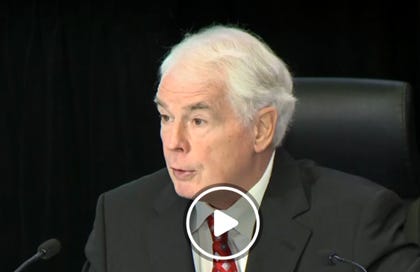One More Failsafe that Fails Us?
Emergency Act hearings have a tight deadline, and loads of extra work.

The Prime Minister of Canada wants you to believe the public hearings examining his use of the never-before-used Emergencies Act are all his idea. In the video above, he says:
We called this inquiry so that Canadians could see exactly why it was needed to invoke the Emergencies Act…
In fact, these hearings are mandatory. If you do A, you must also do B. That’s how it works. Commissioner Paul Rouleau, the judge in charge of these hearings, made this clear on the first day. Lines 20-27 on page 4 of the official transcript, were uttered in French. Here’s an auto-generated Google translation:
The mandate given to the Commission by Parliament is found in the Emergencies Act. When Parliament passed this law in 1988, it chose to include an important rule in it. If the government declares a state of emergency, it must also create an inquiry to investigate and I quote “the circumstances which gave rise to the declaration and the measures taken to deal with the crisis” end of quote. [bold here and below added]
Commissioner Rouleau says these hearings are about “public accountability, the public's legitimate right to know why the Government proclaimed an emergency, and whether the actions it took were appropriate."
But here’s where things start to go sideways. The Commissioner then explained that the Justin Trudeau cabinet piled on a raft of additional obligations:
When Cabinet took the step of establishing this Commission, as it was required to do, it set out an additional mandate: Our Order in Council directs the Commission to examine, first, the evolution and goals of the convoy movement and border protest, and their leadership organization and participants. Second, the impact of domestic and foreign funding, including crowdsourcing platforms. Third, the impact, role, and sources of misinformation and disinformation, including social media. Fourth, the economic and other impacts of blockades; and, finally, the efforts of police and other responders prior to and after the declaration.
The Freedom Convoy that travelled to Ottawa and the blocking of border crossings are separate and independent of each another. In reality, therefore, there are six new topics to consider:
the Freedom Convoy’s history, goals, leadership & participants
the history, goals, leadership & participants of those who blocked border crossings
Freedom Convoy funding
misinformation and disinformation
economic impacts of the border crossing blockages
the role of the police
Topic #4 - misinformation - is serious enough, massive enough, and complex enough to warrant a thorough inquiry all on its own. An entire book could easily be written just about that. In other words, this looks awfully like an attempt to muddy the water, to shift the focus away from government actions, to cast blame elsewhere.
One reason this matters is that the Emergencies Act has an extremely tight, built-in deadline. Again, here’s Commissioner Rouleau:
Our deadline is established by statute…and it allows, by statute, for no extensions. Just how tight are the timelines? Let me try and put it in context for you.
The Air India Inquiry was established on May 1st, 2006. It took just over four years to issue its report…The Commission on the Decline of Sockeye Salmon was established on November 5th, 2009 and its report was made three years later…The Inquiry into Missing and Murdered Indigenous Women and Girls was established in September 2016 and issued its report almost three years later…
This Commission, on the other hand, was established in April and must table its report in Parliament on…February 20th, 2023.
A grand total of 10 months. An unusually short amount of time to begin with, exacerbated by tons of extra work.
Over the past two to three years many of us have lost trust in our institutions. We’ve watched in horror as one entity after another that exists to provide checks-and-balances failed us. Unions didn’t stand up for the bodily autonomy of their members. Physicians and nurses didn’t insist, en masse, on the sanctity of informed consent. Medical colleges persecuted - rather than defended - doctors who spoke out against a tidal wave of unethical behaviour. The vast majority of lawyers kept their heads down rather than challenge the widespread undermining of civil liberties, the shuttering of churches, and the jailing of pastors. Journalists became government and pharmaceutical company mouthpieces - lapdogs rather than guard dogs.
These past few years have taught us healthcare is not a private matter. We now know the vast majority of doctors will do what the government tells them to do - irrespective of what’s best for their individual patient. Trust has been absolutely shattered. And it isn’t coming back anytime soon.
This is the context in which Commissioner Rouleau is holding his hearings. Will this inquiry begin the long healing process? Or will it be one more failsafe that fails us?
Let us fervently hope Commissioner Rouleau is a man of integrity. One who understands that this is his moment. History will judge him by what he does here.






Awesome every day, Donna - thank you